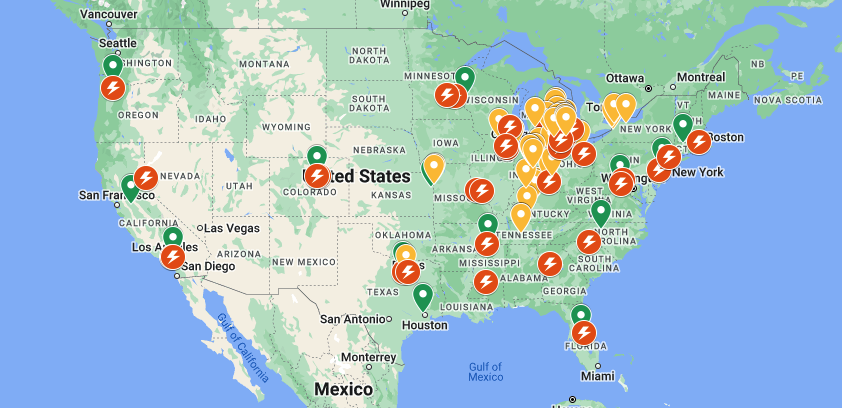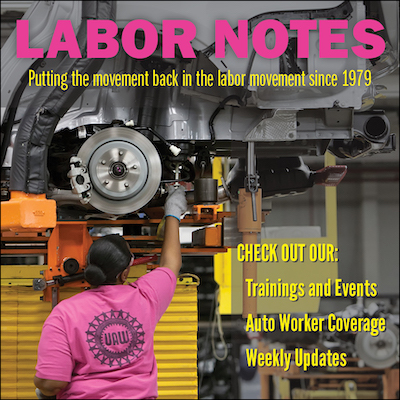Auto Workers Strike Spreads to 38 Parts Depots

Stellantis workers from Auto Workers Local 412 protest outside the company’s Detroit headquarters September 20. Photo: Jim West, jimwestphoto.com.
The clock has ticked and tocked for two of the Big 3 automakers. At noon 5,000 more members of the Auto Workers (UAW) at 38 parts distribution centers for Stellantis and General Motors walked off the job. The facilities are spread across 20 states.
They join 13,000 workers at assembly plants in Ohio, Michigan, and Missouri who have been out for a week—for a total of 18,000 Big 3 auto workers on picket lines nationwide. (See a map of all struck facilities here.)
The escalation adds a new type of facility to the mix. Parts distribution centers (PDCs) supply after-sales spare parts and accessories to dealerships, a very profitable part of the companies’ business.

Most facilities have between 50 and 150 workers, but some are much larger. According to GM, the Davison Road Processing Center in Burton, Michigan, has more than 1,200 employees and processes 9.9 million pieces per month, filling orders for domestic and international customers. GM has invested $168.5 million in the million-square-foot facility.
Why strike the parts distribution centers? “There are several reasons,” Fain told Labor Notes. “One of our issues is ending tiers. They’re a big example of that. Their wages were capped at $25 some years back, during the greatest times in the history of these companies, and that’s gotta change.
“These workers have been stepped on long enough. These workers carried us through the recession. They were working seven days a week when everybody else was sitting at home laid off. They deserve their fair share.”
Ahead of the September 15 strike the Big 3 automakers scrambled to make contingency plans in case PDCs were struck. Ford attempted to train 1,200 salaried non-union workers to work in PDCs, and Stellantis hired non-union workers to stockpile parts at a facility in Belvidere, Illinois.
The three already-struck assembly plants, where workers produce vehicles in the final step of auto manufacturing, will remain on strike.
In a Facebook Live message today at 10 a.m., UAW President Shawn Fain announced the new strike targets and invited everyone to join workers on the picket lines, “from our friends and families all the way up to the president of the United States.” (Find advice on how to support picket lines here.)
Noting that the struck facilities are all over the country, he said, “We will be everywhere.”
He also shared examples of the creativity emerging from members, such as solidarity convoys where workers from the Stellantis Jeep plant in Toledo drove over to the Ford Bronco plant in Detroit, and vice versa.
“Our employers are in competition, but the workers, we are proving to America that we are all unified in one front here," said Ford worker Randy Miller on the Michigan Assembly picket line yesterday as Ford Broncos and Jeeps trundled by, honking horns and waving American flags and UAW picket signs.
MAKING HEADWAY AT FORD
The UAW has dubbed its escalation strategy the “Stand Up Strike,” since more workers can be asked to “stand up” as the strike grows, while others keep working under their expired contracts. The idea is to ramp up based on progress at the negotiating table, inflicting increasing financial pain on the automakers if they are intransigent in meeting members’ demands. “We are focused on moving companies at the bargaining table,” Fain said.
Those demands include ending tiers, converting temporary workers into permanent employees, restoring cost-of-living adjustments tied to inflation, winning back defined pension plans, providing retiree health care, and ensuring job security in the transition to electric vehicles, among others.
“We know the companies can afford to make things right,” Fain said. “We will shut down parts distribution until those companies come to their senses.”
Fain enumerated significant progress with Ford at the negotiating table. The company has agreed to reinstate the cost-of-living increase that was suspended in 2009. Workers will have the right to strike over plant closures while the contract is in effect. All temporary workers will be converted to full-time after 90 days.
And both Ford and GM have agreed to eliminate a wage tier—the one that includes, at Ford, Rawsonville Components and Sterling Axle, and at GM, Components Holdings and Customer Care and Aftersales.
Stellantis, however, is still insisting on maintaining a lower tier at its parts distribution arm, Mopar.
The strike at Ford’s Michigan Assembly plant in Wayne will continue, but no additional Ford facilities are joining the strike today.
Unifor, which represents 18,000 auto workers at the Big 3 in Canada, reached a tentative agreement with Ford on Tuesday. Details of the agreement will be released to members Saturday morning and they will have until 10 a.m. Sunday to vote whether to accept it. Unifor has pursued a more traditional, less combative approach to negotiations.
HIGH FIVES AND FIST BUMPS
At GM's Willow Run Redistribution Center, a parts center in Belleville, Michigan, worker Terry Ward was in the plant working the first shift during Fain's livestream. He said everybody was listening on their cell phones, the sound echoing around the plant. When the announcement was made, there were high fives and fist bumps.
"Work was a little slow after that," he said.
Management couldn't believe it, said another first-shift worker, Nicole Fuqua. She's glad to see the union targeting the parts centers, because they generate so much profit for the automakers: "If you're going to hurt 'em, you might as well hurt 'em where they're getting the most money from."
LaShawn Dawkins was happy that "we get to come out here and stand for what we want."
Workers leaving the plant drove out down the long driveway. Then many parked their cars and came out to stand together, along with supporters from other locals who had come to stand with them.
"We have to support our GM brothers and sisters," said Local 387 member Kayla Joseph, a fourth-generation Ford worker. She was relieved this morning when she heard about the progress at Ford, but "we still have a ways to go."
Her grandparents' pension was exactly the same as the pension her dad will get when he retires in two years, she said, showing how long retirees have gone without an increase.
"We're all ready to walk at any moment," she said. "We're trusting the leadership. Shawn Fain is doing a good job delivering on his promises. He's keeping everyone on their toes, including the workers."
Angel Muniz came with his own bullhorn from Local 900, the Ford Bronco plant on strike now. "No Bucks, No Trucks!" he yelled. Yesterday he participated in a 60-vehicle convoy down to the Jeep plant in Toledo to show solidarity. He said he has 11.5 years seniority, and he's constantly in pain.
One of his main issues is health care after retirement, something that second-tier workers like him don't currently receive. Even though he's a veteran and has the VA, he said he wants it for other people.
Muniz said he had voted for ex-President Ray Curry, the candidate of the union's former ruling Administration Caucus, "but in the end I'm happy my guy didn't win the election. Finally we've got a leadership with teeth."
HOLDIN’ STRONG
At noon Fain traveled to the Stellantis Center Line National Parts Depot, outside Detroit.
Workers there walked off the job through turnstiles to dabs and hugs. Bargaining committee members and supporters in red shirts were there to cheer them on. UAW VIce President Rich Boyer chanted “Save Mopar!” Others chanted, “No pay, no parts.”
“We holdin’ strong,” said Lisa Webster, a 27-year Stellantis worker. “We deserve for them to do right by us. We need them to restore everything that we gave up in 2008 to keep the company afloat when they went into bankruptcy.”
She sees new possibilities with Fain at the helm of the UAW. “I back my president 100 percent,” she said. “So long as we need to be out here, I’m out here.
“We held the company down during Covid when they shut down all plants. Mopar was the only plant up and running throughout the whole quarantine.”
As vehicle prices have shot up, consumers are spending more on upkeep of their existing vehicles. Workers know the value they produce.
“When cars aren’t selling, Mopar makes the money for the company,” Webster said.
Stellantis wants to carve out the parts distribution centers from its assembly plants. The company has proposed shutting down 18 facilities and turning them into fewer but bigger gigantic Amazon-like parts and distribution hubs.
Already shutdowns from the GM assembly plant in Missouri have created a shortage of stamped parts in Fairfax, Kansas, where union members have been laid off. Ford laid off 600 workers at the Michigan Assembly Plant's body and stamping departments (only the final assembly and paint departments had struck). The union said it will pay them strike benefits.
EIGHT AND SKATE
What should workers not on strike and working under the expired contract be doing? “Keep doing what you do,” Fain said. “Keep delivering quality parts and keep an eye on your plant.
“If the company is trying to make any unilateral changes, you have a right to fight that. You can fight just as hard in that plant working as you can out on the picket line.”
The union has distributed information for those working under an expired contract, including the information that companies cannot legally make unilateral changes to wages and working conditions. “Report it if you see something change,” Fain said.
On Facebook Live this morning, Fain told members still working, “Remember, it’s your right to refuse voluntary overtime.”
“There’s a million ways you can stand up for the membership and stand up for yourselves,” Fain said.
Workers in several plants report that they are refusing voluntary overtime. At Stellantis’s Mack Assembly in Detroit, UAW members are encouraging each other to “Eight and Skate.”
The reform caucus Unite All Workers for Democracy has launched a pledge to refuse voluntary overtime and is providing organizing support to workers who have signed the pledge, as well as distributing leaflets with information from the international union on voluntary overtime.
When the contract is in force, workers can individually refuse voluntary overtime, but they are not allowed to coordinate a refusal. But they can do so now that the contract is expired.
UAWD is also organizing “flying squadrons,” reviving the UAW tradition of bringing groups of workers to the picket lines of locals that are out on strike.
This is a developing story and will be updated throughout the day. Jane Slaughter contributed reporting.








You must log in or register to post a comment.